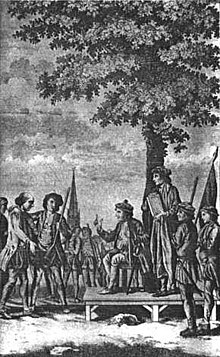Robert Kett
They tore down the enclosure fences Flowerdew had erected on the Hethersett common, and having thus come into prominence, he headed the men of Norfolk when they rose in rebellion in 1549 owing to the hardships inflicted by the extensive enclosures of common lands and by the general policy of Edward Seymour, 1st Duke of Somerset, then Lord Protector.
Leading his followers to Norwich, Kett formed a camp on Mousehold Heath, where he is said to have commanded 16,000 men, introduced a regular system of discipline, administered justice and blockaded the region.
It is notable in reflecting the language of the new religion, in line with the Lord Protector's inclinations; and in its carefully diplomatic format of requesting changes.
Broadly speaking, the clauses seek: He refused the royal offer of an amnesty on the grounds that innocent and just men had no need of pardon, and on 1 August 1549 attacked and took possession of Norwich.
John Dudley, Earl of Warwick, marched against the rebels, and after his offer of pardon had been rejected he forced his way into the city, driving its defenders before him.
